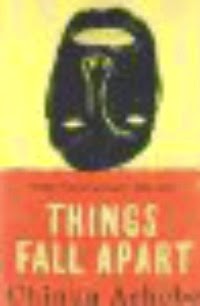(The above is a clickable image.)
Things Fall Apart tells the story of a tribesman, Okonkwo, and how he handles the steady changes in Umuofia and Mbanta. It begins by explaining why Okonkwo has such a hard character, and, when it comes right down to it, it is because of his father. Unoka was in no means a horrible man, but, in the eyes of his fellow tribesmen, he was a coward who was indebted to many men. In everything Unoka could have possibly taught Okonkwo, it was that cowards never amounted to anything.
As Okonkwo grew older, he proved to his tribe that he wasn't anything like his father. And, though deep down inside he may be compassionate, he never showed it outwardly. Okonkwo gained land, had three wives, and was a successful farmer. Despite all of those amazing, honorable qualities, he still wasn't happy, and lived his live in inseparable fear. Not only was he fearful, he had a terrible temper. His children were often fearful of him, and his wives too. When his second wife sassed him about never shooting anything, because he was a terrible at target, he drew the gun on her. Another incident was when his third wife left her children with his first wife to get her hair plated, and didn't have supper ready, Okonkwo beat her mercilessly during the week of peace.
Okonkwo wasn't always cruel, though often times he was. Ezinma, his daughter, held a special place in his heart, where most of his children did not. He often wished that she were a boy, because she showed immense potential. Ikemefuna, his foster child so to speak, also was near and dear to him, but he allowed his fear of failure to overcome him, and acted against his compassion.
Okonkwo was faced with many challenges from there on out, creating his downfall. He was exiled, lost a son, and was arrested. Okonkwo was a narrow-minded man, and was unable to see others' points of views a lot of the time. When the Christian missionaries settled in Mbanta, he let it slide off as ignorance of his mother's people. And, when he returned back to Umuofia, he realized that the missionaries had more in mind than just a few converts here and there. As he was arrested, he vowed revenge to the white people. When his tribesmen voted against a war, he made his own revenge by killing the messenger. Ultimately, he betrayed his people.
This is a very different book than to what I usually read. It's political, and teaches its readers diversity between the Christians and the tribesmen. Though it is a good book all-in-all, it wouldn't be my first pick of a novel to read.



No comments:
Post a Comment